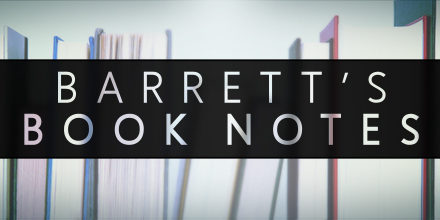
Barrett’s Book Notes: The book of Daniel, the Canon, Secularism, and Eusebius
 James M. Hamilton Jr. With the Clouds of Heaven: The Book of Daniel in Biblical Theology. Downers Grove, IL: IVP, 2014.
James M. Hamilton Jr. With the Clouds of Heaven: The Book of Daniel in Biblical Theology. Downers Grove, IL: IVP, 2014.
Hamilton continues to impress with his ever-increasing rate of publication, not to mention the quality of his scholarship. His most recent book (I think!) is in the New Studies in Biblical Theology series, edited by D. A. Carson, and, as the title suggests, it is a treatment of Daniel from the vantage point of biblical theology. The book is expansive in its scope, placing Daniel in its redemptive-historical context, examining the literary structure of the book, the seventy weeks, the “son of man” theme, the NT’s interpretation of Daniel, typological patterns, and much more. Hamilton both preached through Daniel and taught a seminar on Daniel as he worked through this material too. So, if you are teaching a class on Daniel, or perhaps you are a pastor wanting to preach through Daniel, read this book first!
P.S., Lord willing, we may have an interview with Hamilton for you in the future.
 Michael J. Kruger. The Question of Canon: Challenging the Status Quo in the New Testament Debate. Downers Grove, IL: IVP, 2014.
Michael J. Kruger. The Question of Canon: Challenging the Status Quo in the New Testament Debate. Downers Grove, IL: IVP, 2014.
If you haven’t read Kruger on the subject of Canon, well, you are just missing out! First, I recommend you read his earlier book, Canon Revisited: Establishing the Origins and Authority of the New Testament Books (Wheaton, IL: Crossway, 2012). Next, jump into this most recent release where Kruger reorients your approach to the canon as he seeks to examine how the canon should be defined, challenging those who would sharply distinguish between canon and Scripture. Kruger also looks at the origins, writing, authors, and date of the canon. Here are some of the questions he addresses: Was there really nothing in early Christianity that may have led to a canon? Were early Christians averse to written documents? Were the New Testament authors unaware of their own authority? Were the New Testament books first regarded as Scripture at the end of the second century?
Kruger will be featured in an interview in the upcoming 2015 issue of Credo Magazine. Keep your eye out for that!
 Mary Poplin. Is Reality Secular?: Testing the Assumptions of Four Global Worldviews. Downers Grove, IL: IVP, 2014.
Mary Poplin. Is Reality Secular?: Testing the Assumptions of Four Global Worldviews. Downers Grove, IL: IVP, 2014.
Personal experience can make all the difference in the world when writing a book. The ideas and concepts discussed and challenged are not merely abstract or theoretical, but ones that have actually impacted life. This is one of the reasons I think Poplin’s book is a must read. Poplin, professor of education at Claremont Graduate University in California, used to live and breathe secularism. But that all changed as God began to open her eyes to the massive gaps in such a worldview. What is remarkable is how God began to do this through one of her own students who was a Christian! In this book, Poplin, now a Christian, takes on material naturalism, secular humanism, and pantheism. If you teach a worldview class, get this book asap. Also, I highly recommend Michael Horton’s interview with her on The White Horse Inn.
 Eusebius of Caesarea. Commentary on Isaiah (Ancient Christian Texts). Translated by Jonathan J. Armstrong. Edited by Joel C. Elowsky. Downers Grove, IVP, 2013.
Eusebius of Caesarea. Commentary on Isaiah (Ancient Christian Texts). Translated by Jonathan J. Armstrong. Edited by Joel C. Elowsky. Downers Grove, IVP, 2013.
Another volume in Thomas Oden’s and Gerald Bray’s Ancient Christian Texts series has released. This commentary on Isaiah by Eusebius of Caesarea is another valuable addition to the series and only continues to expand our knowledge of the Fathers and how they understood and interpreted books of the Bible. While students of the Fathers will know Eusebius best for his book, Historia Ecclesiastica, this work of exegesis on Isaiah has gone under the radar as it has not been available, nor has his commentary on the Psalms. Also, Armstrong notes how this “is the first Christian commentary on the prophet Isaiah to have survived to the present.” So this is a first! What a privilege it is to have this translation in modern language. Thank you, Armstrong, for your hard work in making this commentary available to English readers. No doubt this work will shed light on the Fathers’ hermeneutics and theology.
Matthew Barrett (PhD, The Southern Baptist Theological Seminary) is Assistant Professor of Christian Studies at California Baptist University, as well as the founder and executive editor of Credo Magazine. Barrett is also Senior Pastor of Fellowship Baptist Church. He is the author and editor of several books, including Salvation by Grace: The Case for Effectual Calling and Regeneration. You can read about Barrett’s other publications at matthewmbarrett.com.
